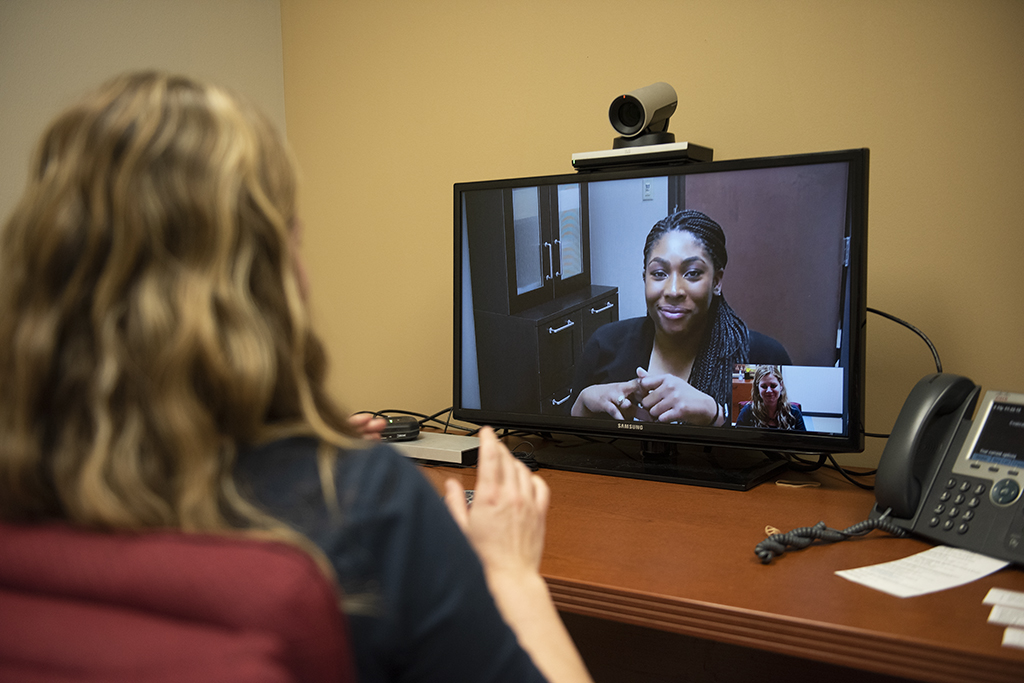No Texan Left Behind: Telebehavioral Care Program

More than three million people live in the 191 Texas counties (out of 254 total) that are deemed rural. Compared with their urban counterparts, rural Texans are older, poorer and sicker. Although many factors contribute to poor health in rural communities, a leading culprit is limited access to health care. Rural Texas has seen more hospital closures than any other state, with 17 hospitals shuttered since 2010. In a state of Texas’ size, many rural residents—hindered primarily by poverty and lack of transportation—cannot afford to go to urban areas to receive basic care. Thus, people in these isolated, low-income areas often forgo regular health care altogether.
At Texas A&M, several research projects and public outreach programs are tackling these rural health disparities. In this “No Texan Left Behind” series, we are highlighting a few of these programs and how they’re helping more people get the care they need: Martha’s Health Clinic, the Southwest Rural Research Center and—here—the Telebehavioral Care Program.
Telebehavioral Care Program
Ten million Texans live in areas without enough mental health providers; in fact, more than half of the counties in Texas don’t have a single psychiatrist or psychologist. Accessing mental health care is difficult in rural areas because of transportation, financial and cultural barriers.
“The best performing counties in the country have a ratio of about 1 provider to every 377 individuals,” said Carly McCord, PhD, clinical research assistant professor in the Texas A&M College of Medicine Department of Psychiatry and director of Telebehavioral Health at Texas A&M. “Some of our counties that we serve have ratios as low as 1 to 19,000.”
With the Telebehavioral Care Program, rural residents can talk to a mental health provider through telehealth—a health service that lets clients in rural areas access care electronically. Rather than driving great distances to go to a therapist’s office, people in this program may have to travel only a couple of miles to receive mental health counseling at a telehealth access point. These discreet access points, fitted with private rooms and the necessary technology, allow clients to video chat with a trained and skilled psychology doctoral student at Texas A&M.
The providers at Texas A&M bring expertise in areas such as anxiety, depression and interpersonal relationships, and this program can offer counseling services for adults, teenagers and couples. In addition to individual sessions, the Telebehavioral Care Program hosts weekly mindfulness group sessions to help clients improve stress management skills.
The Telebehavioral Care Program, which is a nonprofit psychological service, research project and training clinic, has been operated at Texas A&M for the past decade and is now a collaboration of the Department of Educational Psychologyand Department of Psychiatry. In addition to the groups who oversee the program operationally, a laboratory in the Department of Health and Kinesiology that is focused on community-based research evaluates the program’s effectiveness. McCord says the people involved in this program are more than just researchers, however. “This program shows how Texas A&M is committed to our land grant mission and stepping outside of the ivory tower to work with communities and not just in them,” she said.
The telehealth program, which has 12 active care sites in the counties surrounding Brazos County, has worked collaboratively with community and clinical partners to bring behavioral counseling to rural communities. To date, the Telebehavioral Care Program has served more than 1,300 clients in Spanish and English and helped train more than 70 psychology doctoral students. In terms of program success, 93 percent of clients have reported that they deal more effectively with problems after finishing therapy.
Coming up are two access points in the Gulf Bend Region, Direct to Texas Services available to anyone in Texas on their mobile devices and a program called Texas Child Health Access Through Telemedicine, or TCHATT, which will bring psychiatry and counseling services to Brazos Valley schools.
“Lives are being changed, health is improving and our entire community is better for having access to these much-needed services,” McCord said.
Story written by Sarah Allen
Media contact: media@tamu.edu


